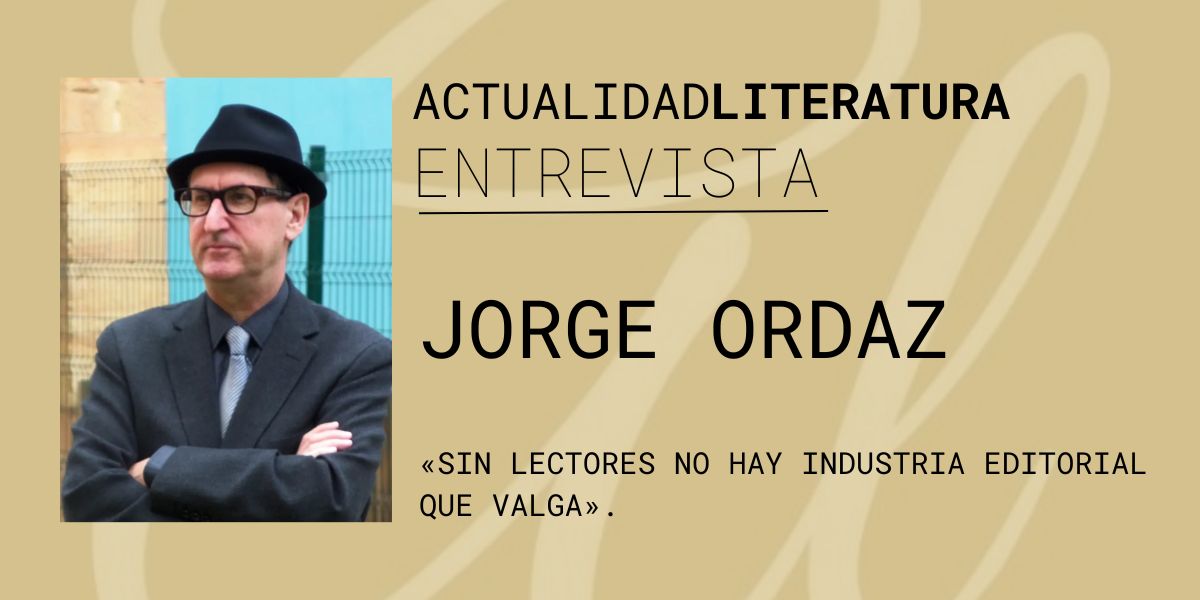
Photography: courtesy of the author.
Jorge Ordaz He was born in Barcelona and lives in Oviedo. He is the author of several books narrative, entre ellos Cabinet of natural sciences, Prima donna (finalist for the Herralde Prize), The confessions of a bibliophage, the "philippine trilogy" formed by The Pearl of the East (Nadal prize finalist), lost eden y The fire and the ashes (Asturias Critics Award) or The dinosaur hunter. In non-fiction highlights The butterfly on the map. He has also participated in various collective books, newspapers and cultural magazines and translated English and North American poets. In this interview He tells us about his latest novel, The sacavera. I really appreciate her time and kindness.
Jorge Ordaz — Interview
- ACTUALIDAD LITERATURA: Your latest novel is titled The sacavera. What do you tell us in it and why will it be interesting?
JORGE ORDAZ: The novel takes place in Oviedo in June 1750. The action begins with the discovery of the corpse of a stranger, which sets in motion a series of events and incidents that bring out the dark side of some of its inhabitants. This is a cool citizen, a choral novel, which I hope captivates the reader. He title responds to name what is given in Asturias to the salamander. Its colors, black and yellow, come to represent the mixture of lights and shadows in a historical moment that is little traveled narratively speaking, and in which invented characters coexist with real ones.
- AL: Can you remember any of your first readings? And the first thing you wrote?
JO: My childhood readings were those of the majority of kids of my time, comics, adventure novels by Julio Verne, Karl May, Emilio Salgari…Later they came The island of the treasure, de Stevenson, Oliver Twist, by Dickens, and Kim, by Kipling, which represented an important qualitative leap for me. My first texts were written accounts of under the influence of Borges, Perucho and Cunqueiro, among others.
- AL: A leading author? You can choose more than one and from all periods.
JO: They are many and very varied: Cervantes a Joyce, from Muriel Spark to Baroja, from Josep Pla to Flannery O'Connor... But if I have to choose just one, I would definitely choose Joseph conrad.
Characters and customs
- AL: What character would you have liked to meet and create?
JO: Of the living characters, I would have loved to meet the American writer Frederic Prokosch, to which I dedicated one of my books (The butterfly on the map). Among the fictional ones, I would have liked to meet the captain marlow, to tell me about his experiences, especially what really happened with Kurtz in Heart of Darkness.
- AL: Any special habits or habits when it comes to writing or reading?
JO: I have few quirks. Like every writer I have my habits and customs. For example, I always start the first chapter of a new book by hand, preferably with a fountain pen. Then I go to the computer. I read preferably on paper.
- AL: And your preferred place and time to do it?
JO: Reading is something I can do anywhere as long as I have time for it. Write It is something more complicated. Requires greater concentration and calm.
- AL: What other genres do you like?
JO: I don't have a favorite genre. For me, before any label, they are books, and they are all worth it as long as they have sufficient literary quality. The genders hybrid I tend to like them more than other conventional ones.
Current outlook
- AL: What are you reading now? And writing?
JO: I'm reading Tedium and narration, by Inma Aljaro, and Poètes et lettres oubliés de la Rome ancienne, by Pierre Vesperini. As for writing, I have to say that, at the moment, I am in the phase of rest.
- AL: How do you think the publishing scene is?
JO: I don't know enough about the inside of the publishing world, but I sense that, in general terms, The sector is doing reasonably well. I want to highlight the meritorious work that small independent publishers are carrying out, paving the way for new authors and texts. In any case, the most important thing is the significant increase in readers. Without readers there is no publishing industry that is worth it.
- AL: How are you handling the current moment we live in?
JO: If the question refers to the current world in which we are immersed, I see it with curiosity, concern and skepticism.